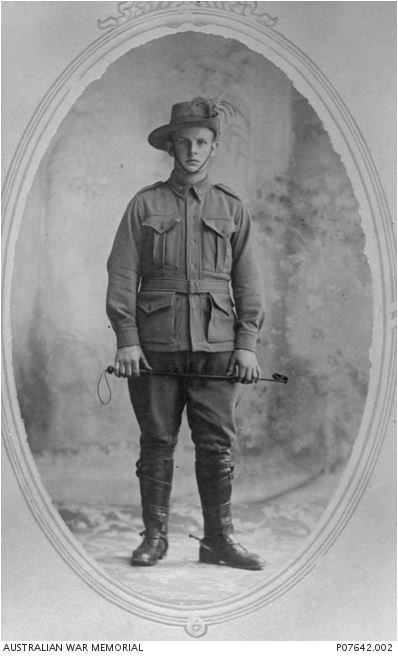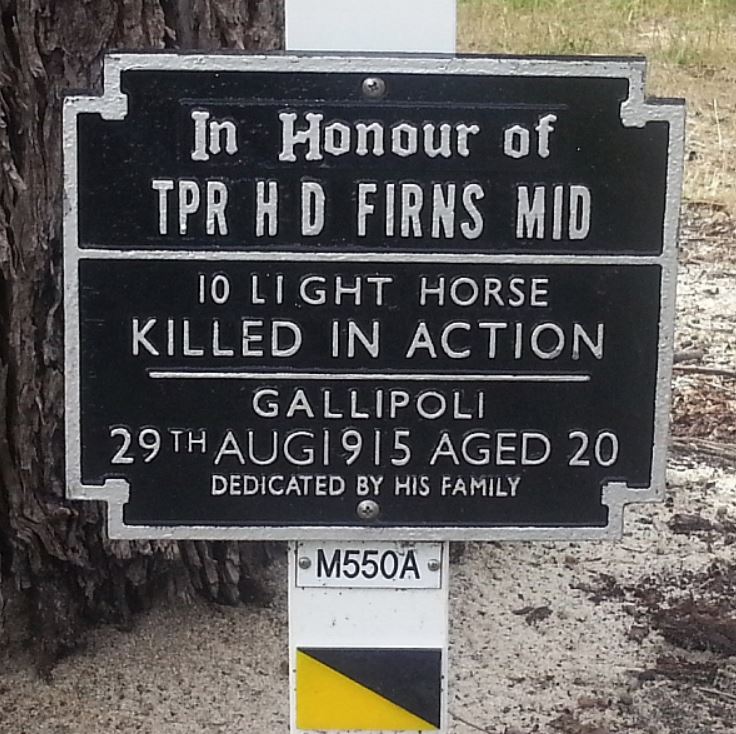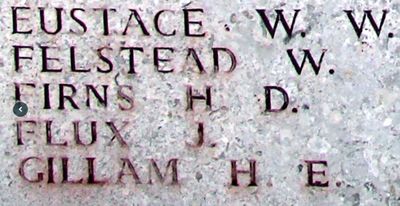Hobart Douglas Firns MID
From Our Contribution
 Australian War Memorial PO7642.002 | |
 King's Park Memorial walk, May drive | |
| Personal Information | |
|---|---|
| Date of Birth | unknown Jun 1895 |
| Place of Birth | Jarrahdale, Western Australia |
| Death | 29 Aug 1915 |
| Place of Death | Hill 60, Gallipoli, Turkey |
| Age at Enlistment | 19 years, 3 months |
| Description |
5'6½" (1.69m) tall ; unknown "unknown" is not a number. ; fair complexion ; grey eyes ; fair hair |
| Occupation | Mill hand (timber) |
| Religion | Church of England |
| Address | Mundijong, Western Australia |
| Next of Kin | Father , Mr Charles Firns |
| Military Information | |
| Reg Number | 110 |
| Date of Enlistment | 5 Oct 1914 |
| Rank | Trooper |
| Unit/Formation | 10th Light Horse Regiment, A Squadron, D Troop |
| Date of Embarkation | 8 Feb 1915 ‒ 9 Mar 1915 |
| Ship Embarked On | HMAT A47 Mashobra |
| Fate | Killed in Action 29 Aug 1915 |
| Monument |
Mundijong School Roll of Honour Mundijong Honour Roll Serpentine Roll of Honour ANZAC Memorial Park (Byford) Lone Pine Memorial Perth Modern School Honour Board Australian War Memorial |
| Medals |
1914-15 Star British War Medal Victory Medal Mentioned in Despatches |
Pre War
Known by all as Doug. At various times he was a student of the Buckingham Siding, Serpentine and Mundijong schools. In February 1910 he was employed as a Junior Monitor at the Serpentine school. The family consisted of seven boys and one girl. After school, the boys worked at their father's timber mill, milked the cows, chopped the wood and helped in the garden. Doug entered Perth Modern School in 1911, but at the time of his enlistment he was working as a Mill hand at a mill owned by his father, one of the numerous timber mills that surrounded Jarrahdale, where he was born in 1896. The family moved from Serpentine to Gosnells then later took up farming at Koorda. Six of the seven boys served their nation in the war in both the army and the navy.
War Service
Given Hobart's familiarity with horses he was signed on as an inaugural member of the 10th Light Horse Regiment, where he joined A Squadron in training near Guildford. However prior to the Army finalising his enlistment processes and accepting him, Hobart was required to have his teeth attended to. This he had done by early December 1914.
Travelled to Egypt with the 10th Light Horse on board HMAT A47 Mashobra, and then on to Gallipoli via Alexandria on 16 May 1915. On 25 Jun 1915 he reported ill with influenza which required him to be evacuated to the 3rd Light Horse Brigade Field Ambulance at Mudros on the 30th for treatment for pleurisy. He recovered quickly and was returned to Gallipoli on 9 Jul 1915.
On 7 Aug 1915 Throssell and his men were part of the third wave of attack at the Nek on August 7th. Having watched on as the first two waves had been mown down in open ground by the Turkish machine guns, they bravely charged for the third attack. Throssell and his men escaped death, as they charged into a sheltered crater, and after many hours under fire, were able to crawl back to the trenches unharmed.
Three weeks later the surviving members of the 10th Light Horse were sent to reinforce the overnight attack by the ANZACs on a fiercely contested area called Hill 60. Many waves of attack by New Zealanders, Irish and Australian troops had been cut down by withering fire.
Units from the Australian 3rd and 9th Light Horse Brigades had been reduced to a handful of survivors. When Throssell arrived, he and his Squadron were sent forward to try again, and on August 29, were the first to succeed in capturing the first Turkish trench. They spent over five hours defending it from counterattack.
The Light Horsemen held the narrow trench against wave after wave of Turkish troops until the dawn put an end to the fight. It was a vicious and deadly bomb and bayonet affair, at times fought against attacks from three sides. Troopers frequently had to pick up live grenades that fell at their feet and throw them back, in between holding back their enemy with rifle fire and in hand-to-hand combat. At dawn there were only a handful of survivors left in the trench, surrounded by the bodies of hundreds of Turkish and ANZAC men. Doug Firns was one of the men who made it to see the sun rise, but was shot by a sniper after the attacks had ceased.
All who survived were decorated for valour, with their leader Hugo Throssell being the first Victoria Cross winner from Western Australia. Doug Firns, one of those who had won the action, but was not lucky enough to survive it, was Mentioned in Despatches.
Although he was buried on the battlefield, the grave was later not found, and today he is remembered on the Lone Pine Memorial to the Missing.
"Gallipoli to Tripoli" [Browning & Gill] at page 158 relates the story told by Pte Stanley, one of the few survivors of the group soon after the battle.
"We bomb-throwers did our work behind two barricades. On our left was an embrasure, rather wide and dangerous, on account of the chance of bombs getting home every time. A bomb-proof shelter was erected over part of the embrasure. We stood between number two and shelter, with a sniper. I was at the side of the Lieut. Another chap was in front of him, and the sergeant behind me changing rifles. Bombs arriving were thrown out quickly, and never once was there a casualty from them, bullets doing all the damage. Ferrier got a bullet after the other bomb-thrower (Francis McMahon) had been killed, and fell half under the bomb-proof. The one in front of the Lieutenant was finished at last, after having some miraculous escapes, and being like a wild man (Hobart Firns)".
Hobart's date of death is given as the 29th August 1915, after he and his colleagues had held enemy trenches for up to 31 hours before being forced to retreat.

Award Comment
Firns was Mentioned in Despatches by Sir Ian Hamilton. [2] [3] Recommended for actions 21st - 30th August 1915. The wording of his recommendation (posthumous) was:
For gallantry during attack on the Turkish trenches on Kaiajik Aghala.
On 25 Aug 1923 the MID Certificate was dispatched to the family where it was received on 14 Sep 1923.
Notes
Burial details: Unknown grave, commemorated on the Lone Pine Memorial, Anzac Cove, Turkey.
Hobart's next of kin was his father Charles Firns who moved around with work. He was living at the time of Hobart's enlistment in Serpentine, later moving to Mundijong and then Koorda.
Three brothers also served with the AIF during WW1. Charles Glyn Firns with the 28th Battalion; Frank Thomas Firns, allocated to Artillery but who did not reach the front lines before the armistice; and George Weston Firns who served with the 48th Battalion. While Charles was Wounded in Action in Belgium on 12 Oct 1916 and at Mont St Quentin on 2 Sep 1918, all three returned to Australia during 1919. In 1919 another brother Thomas E Firns was serving on the HMAS Sydney.